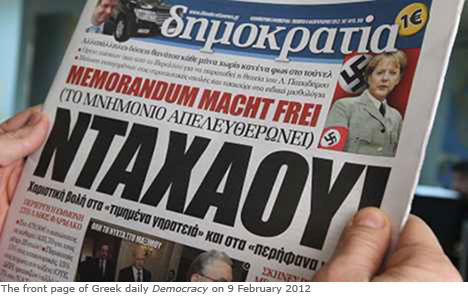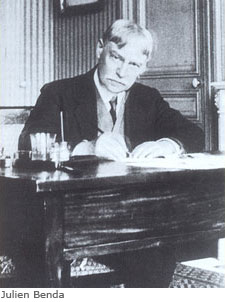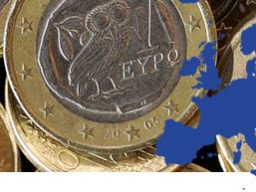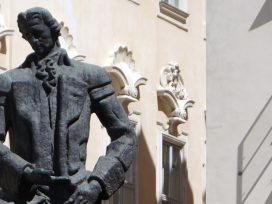Towards the end of last year, as the Eurozone crisis was reaching (yet another) climax, a number of journalists in the German quality press alerted their readers to an aspect of the crisis which had received scant attention so far: the euro crisis marked not only the failure of Europe’s central bankers, or Greek bureaucrats, or Italian non-taxpayers, or Angela Merkel (all depending on one’s perspective) – it also signified a comprehensive failure of intellectuals. Why were they not defending the great achievements of European integration? Why were they not putting forward appealing visions of the continent’s future, instead squandering a great legacy of mutual trust and understanding among Europeans which had been nurtured over many decades? Were they simply sleeping through a crisis that might eventually usher in the return of ugly nationalisms? Or even military conflict, as elder European statesmen like Helmut Kohl never tire of warning?
The idea of a distinctive “failure” or even “betrayal” of the intellectuals originated in the twentieth century. The latter was commonly understood as an “age of ideologies”: ideas not only mattered in some vague general manner, they could be directly translated into politics and turn into deadly forces. Just think of Czeslaw Milosz’s famous observation that in mid-twentieth-century Europe “the inhabitants of many European countries came, in general unpleasantly, to the realization that their fate could be influenced directly by intricate and abstruse books of philosophy”. Intellectuals acted on the world-historical stage, taking part in the bloody drama of the battle between liberal democracy, fascism, and Soviet communism.
Given this role, what constituted “failure”? Not speaking one’s ideologically prescribed lines correctly? In 1927 the French essayist and moraliste Julien Benda accused fellow writers and philosophers of betraying their vocation by advocating nationalist positions: proper intellectuals would speak (universal and timeless) truth to power, he argued, instead of being in the business of advancing the national interest. But intellectuals defending universalist, communist ideals were also charged with treason, primarily for buying into Stalin’s lies and turning a blind eye to the increasingly obvious shortcomings of the Soviet Union.
Today, the whole language of failure might strike us as odd: intellectuals are not schoolchildren who might flunk tests, with other intellectuals keeping score on them; nor are they bound by the same codes of practice as trained professionals. But that does not mean that, in the rather different circumstances of twenty-first century Europe, intellectuals cannot get matters fundamentally wrong when judged against a set of liberal democratic values: they might become rabid nationalists themselves, or implicitly condone rising nationalism by not speaking out against it. They might also fail by simply overlooking the profound injustice of what is currently being done in the name of austerity and fiscal rectitude.
One need only think of the obvious examples, Greece and Germany: while matters have remained relatively civilized between the two countries at high-level politics, their respective civil societies are getting less and less civil. On Syntagma Square, demonstrators are holding up posters equating the new, EU-imposed regime with Dachau (culminating in the slogan Memorandum macht frei); there is now even a party that, in all but name, is the anti-German party (the “Independent Greeks”, Anexartitoi Ellines, who promise resistance against the “Fourth Reich”, alluding whenever they can to the German occupation in the 1940s). In Germany, on the other hand, while there is no comparable rhetoric and symbolism equating past and present (for obvious reasons…), there is still a lot of grumbling about lazy southerners, encouraged by a profoundly irresponsible tabloid press.
 Yet those clamouring for a stronger presence on the part of European intellectuals usually want more than reasonable voices attempting to restrain nationalism: they demand nothing less than visions and grand narratives. After all, there was no lack of these in the European past: for the period between 1306 until 1945, historians have counted at least 182 grand designs for European unity (with figures like the Abbé St.-Pierre and, of course, Coudenhouve-Kalergi as distinct highlights). But while there were many high-level cultural encounters in the post-war period devoted to European unity or the supposed “crisis of European civilization” (some featuring Julien Benda, as it happened), it would be hard to maintain that the 1950s or 1960s was a golden age for intellectual debates about – let alone for – Europe.
Yet those clamouring for a stronger presence on the part of European intellectuals usually want more than reasonable voices attempting to restrain nationalism: they demand nothing less than visions and grand narratives. After all, there was no lack of these in the European past: for the period between 1306 until 1945, historians have counted at least 182 grand designs for European unity (with figures like the Abbé St.-Pierre and, of course, Coudenhouve-Kalergi as distinct highlights). But while there were many high-level cultural encounters in the post-war period devoted to European unity or the supposed “crisis of European civilization” (some featuring Julien Benda, as it happened), it would be hard to maintain that the 1950s or 1960s was a golden age for intellectual debates about – let alone for – Europe.
One can think of exceptions, especially those idealists who emerged from the various resistance movements and advocated a federal, democratic Europe – think of Walter Dirks and Altiero Spinelli. But intellectual commitment had many other objects – the Cold War and decolonization, above all – that clearly took priority over a Europe which, in any event, now seemed to be a mere plaything of the superpowers. In fact, there was often a sense that only when a proper stance had been worked out on these larger moral issues, and when Europe itself had somehow ceased to be tainted by, variously, colonialism or capitalism, should intellectuals speak up for European integration as such. The French sociologist Edgar Morin, for instance, was one of many leftwing intellectuals who held that the very term Europe remained contaminated by the evils of colonialism. It was only after decolonization in the 1960s that the Left could begin to support the idea of European unity.
Still, the general point holds: European integration advanced in the absence of anything like grand intellectual visions. In fact, as any decent textbook on the EU will emphasize, the whole idea was integration by small steps, or, put less politely, integration by stealth. The founders – Jean Monnet, above all – might have had high moral purposes, but the project itself advanced on the basis of technocratic imperatives, not because ever more Europeans saw the moral value of European-wide political community-building.
Of course, in the eyes of many observers today, that was precisely the problem. Monnet’s apocryphal sentence – that he should really have started with culture – is ritually invoked by those who see the Union’s prime deficit as a lack of meaning and an ability to inspire loyalty, or even just “enthusiasm”. Intellectuals, so the argument goes, should catch up with a project that was implemented without them – but which now desperately needs them to articulate reasons for its further progress (and, ideally, a master narrative that justifies its past, its present and its future all at once).
That, however, is merely another way of saying that intellectuals should engage in a repeat performance of their classic nineteenth-century role: writers and historians, especially, should legitimate a grand national (or now: supranational) unification through powerful stories and the identification and, ideally, codification of “European values” – perhaps even in form of the Great European Novel. Of course this is a caricature: not everyone writing a European history or conceptualizing a museum of Europe is in the nation-building business or wants to deliver a legitimation narrative to the masters in the Berlaymont; in fact, it remains eminently reasonable and desirable that historians from different nation-states explore each others’ perspective and test to what extent they can indeed be integrated. And yet: the demand for the grand European story ultimately is faithful to the logic of nineteenth-century nation-building. It is often put so bluntly that there can be no doubt about the intended instrumental value of the story – think of calls to view the Holocaust as Europe’s “foundation myth”, which, historically, is simply nonsense. To be sure, it’s not peasants into Frenchmen through military service and republican lycées all over again – but the underlying idea that political communities need a shared narrative is clearly there. To put the point starkly: with this vision, supranationalism is still nationalism; a nation called “Europe” is still a nation. And if there is something morally problematic about nationalism – as there clearly is, in the eyes of Benda and all those who adopted his template for the role of the intellectual – then intellectuals should stay well clear of the vision business and the manufacture of quasi-national master narratives.
 But then why not simply adopt Benda’s model – and adapt it to a European context? Why not make it the primary mission of intellectuals to uncover injustices, hurl a heart-felt J’accuse! at its perpetrators and speak truth to Brussels-based power? The problem here is this: it’s far from obvious why Europe – and, more specifically, the EU – should be the relevant framework for such moral questions. Think of large-scale socio-economic inequalities. They obviously exist in Europe; but inner-European inequalities fade into moral insignificance when compared to inequalities on a global scale. Global inequality is a daily scandal; inner-European income differentials are worth serious social scientific study and could maybe even become the object of social protest – but they simply aren’t a matter of great moral outrage.
But then why not simply adopt Benda’s model – and adapt it to a European context? Why not make it the primary mission of intellectuals to uncover injustices, hurl a heart-felt J’accuse! at its perpetrators and speak truth to Brussels-based power? The problem here is this: it’s far from obvious why Europe – and, more specifically, the EU – should be the relevant framework for such moral questions. Think of large-scale socio-economic inequalities. They obviously exist in Europe; but inner-European inequalities fade into moral insignificance when compared to inequalities on a global scale. Global inequality is a daily scandal; inner-European income differentials are worth serious social scientific study and could maybe even become the object of social protest – but they simply aren’t a matter of great moral outrage.
But what, one might object, about the much-lamented “democratic deficit” of European institutions? It is here that we get closer to what seems to me to be one proper – though also quite modest – role for European intellectuals today. The EU has famously been called – by the head of its very own Commission, no less – an “unidentified political object” (and if Jacques Delors couldn’t identify it, then who could?). Put with more pathos: the EU is the most important institutional innovation since the creation of the modern democratic welfare state – but it is very hard indeed to make sense of it, and to understand its actual workings. The complex links between European nation-states and Brussels can be tricky to untangle even for the savviest insiders of the game of European politics – and questions of legitimacy and how legitimacy can be grounded in the lived experience of actual Europeans are even more difficult. Here, intellectuals could have an obvious role as what I would call clarifiers: they could take it upon themselves to explain Europe to their audiences and, this is crucial, outline the normative choices in developing the EU as we know it, or perhaps creating an altogether different polity (such as an actual supranational democracy, as opposed to a situation where the legitimacy of EU actions is ultimately derived from the acts of national parliaments).
Some might find this an all-too deflated vision for what intellectuals can do – should they not strive to be more than what, in the US, is often confusingly called “public intellectuals” (by which Americans simply mean academics who can actually explain something to an educated public, or, in a word: experts)? Not quite: the point is that intellectuals occupying the role envisaged here should not just be engaged in what the French, with a wonderful expression, term vulgarisation – they should also weigh normative arguments, but in such a way that European citizens are able to come to their own considered moral and political judgments about what to do with their “unidentified political object”. That is to say, clarification and public justification should go together. This is also an eminently democratic role: it is not about whipping up enthusiasm for a particular vision (in the way the EU public relations people sometimes try, with famously disastrous results – see the recent film about a white European superwoman subduing various barbarians – Asian, black, Arab – by turning them into yellow stars, of all things); rather, it is about clarifying the options – and what they might mean morally – and then leaving it to the peoples of Europe to decide.
The prime example of this kind of work – many readers will not be surprised here – are the interventions of Jürgen Habermas, who is not just Europe’s most important intellectual, but also the most important intellectual sincerely trying to grapple with the meaning and the potential futures of the EU. One can find the details of Habermas’ analyses intellectually provincial (Perry Anderson recently pointed out that in Habermas’ latest essay on Europe three quarters of the references were to German authors, all others Anglo-American; apparently the rest of Europe is non-existent intellectually); one can criticize Habermas for being inattentive to the lived experience of actual Europeans across the continent; one can find his prescriptions hopelessly idealistic – and yet the fact remains that here is an intellectual who sincerely tries to learn from experts, to explain what he, rightly or wrongly, takes to be the achievements, shortcomings as well as normative potential of the Union, and thus to advance a serious political conversation. Put differently: one can reject the content of what Habermas proposes, and still find the model he furnishes for intellectual engagement with Europe attractive.
But it’s not the only model: there is yet another role for European intellectuals, one that used to be taken almost for granted yet is now in danger of disappearing. As has often been pointed out, up until the 1930s at least, there existed a genuine European Republic of Letters, in which writers and philosophers engaged with each other easily across national borders – and in which they also explained other national cultures to their readers. One might think of the extraordinary relationship between a Stefan Zweig and a Romain Rolland, or the work of a literary scholar like Ernst Robert Curtius. To be sure, this all happened at the level of what today might be dismissed as “mere high culture” – but the point is that it did happen. And, in a somewhat different vein, it continued, at least for a while, after the Second World War, when the imperative of reconciliation loomed large. Think of figures like Alfred Grosser and Joseph Rovan, who explained the French and the Germans to each other. These weren’t just glorified apologists for national quirks, or mediators who would quietly disappear when rapprochement was complete: they had standing in their own right. But, effectively, they did perform the role of sophisticated cultural translators and political mediators.
And now? One might be forgiven for thinking that the more Europe integrates politically, legally and economically, the more provincial and inward-looking its individual nation-states become culturally. Easyjet and the Eurovision song contest are not a substitute for a Republic of Letters, where intellectuals have a genuine feel for at least two or three different European cultures. Of course, there are exceptions: if you are reading this, you are looking at one of the major websites where Europeans can learn about the debates taking place in other countries (and, not least, about how intellectuals in other countries perceive their neighbours).
There is no panacea, as far as creating a genuinely European public sphere is concerned. One can only hope that individuals will become more curious, more willing to see the rewards in the work of translation and mediation. It might seem all very humdrum – but it is actually an urgent task, not only, but especially at this critical juncture. To take an obvious example: Germans (and other “northerners”) need to understand the history of the Greek civil war, the ways the Greek state was used to pacify a deeply polarized society, and the way European money served to create a middle class which helped parties stay in power, but also diminished the dangers of renewed social conflict (none of this is an excuse for corruption and a generally dysfunctional state – tout comprendre ce n’est pas tout pardoner). Conversely, it would be helpful if observers outside Germany got a grip on the particular strand of liberal economics that has been animating policy-making in both Bonn and Berlin for a long time: that strange thing called Ordoliberalismus, whose representatives conceived of themselves as the real “neoliberals” – liberals who had learnt the lessons of the Great Depression and the rise of dictatorships in the twentieth-century, and who precisely did not want to equate liberalism with laissez-faire. For them, soi-disant neoliberals like Ludwig von Mises were simply “paleoliberals” who remained stuck in nineteenth-century orthodoxies about self-correcting markets. The German neoliberals, on the other hand, wanted a strong state able and willing not only to provide a framework for markets and society, but also to intervene in the former for the sake of ensuring competition and “discipline”.
Again, an understanding of such ideas is not the same as accepting them (with Ordoliberalismus, in particular, there are good reasons to be suspicious of its illiberal, perhaps even authoritarian side). The point is that a more productive and sophisticated debate cannot ignore the profoundly different national starting points for thinking about politics (and economics, of course). In that sense, what I have called clarifiers and the mutual explicators of national traditions need to work together.
But, one might object, just clarifying and explaining – is that all there is? Wouldn’t the European debate then be merely the sum of what national explicators are saying to each other? There is more (and we’ll get to it in a moment), but these are the two tasks which, so to speak, are an ongoing concern. Every generation has to take them on in a new way; and they do not depend on having to respond to a particular challenge – if anything, they leave publics better prepared to react to crises, especially political crises.
Which brings me to my last point, which is about political crises that concern everyone: if the European Union is one polity and if European citizenship means anything at all, then there are no longer internal affairs of individual nation-states that other Europeans are not entitled to talk about or judge. And if, in any European country, democracy and the rule of law are clearly under threat, then it is the task of all European intellectuals to raise the alarm. The obvious contemporary case is Hungary, which may well become the first member state to face serious EU sanctions for backsliding towards a form of illiberalism.
In the face of stern criticisms from the European Parliament and the Commission, the Hungarian Prime Minister Viktor Orbán has conjured up the image of a transnational leftwing conspiracy, led by the likes of Daniel Cohn-Bendit, who supposedly merely resent the values for which Orbán and his allies stand: national pride, Christianity, traditional conceptions of the family. Just as he has tried to start a comprehensive Kulturkampf within his own country, Orbán – a man who thrives on conflict and polarization – has sought to divide Europe as a whole between the liberal-left, which apparently includes nominally conservative figures like Manuel Barroso (an ex-Maoist, to be sure), on the one hand, and, on the other, what Hungary’s prime minister recently called the “hidden” or “secret” Europe – a Europe that is in line with his party’s values, but dare not speak its name.
It is tempting to see such a conflict as ultimately desirable, even if one disagrees with everything for which Orbán stands: might it not be the cunning of European integration history that transnational conflict ultimately brings about a more unified Europe? Is politicization (and even polarization) not a good thing in and of itself, because it invigorates institutions like the European Parliament, makes intellectuals from all sides join the fray, and even forces individual European citizens to pay attention?
That thought might be a tad too dialectical: after all, urgent first-order issues are at stake, and any present-day Hungarian suffering cannot be justified with the long-term benefits in advancing lofty ideals of European unity. It is perhaps a by-product, but by no means the primary purpose, of the fight for the much-vaunted “European values” that these values might in the process become better clarified and, ultimately, further entrenched; it is incumbent on European intellectuals to explain why, for instance, a certain shared European understanding of the rule of law is not some partisan or provincial take on a universal value from which one might deviate in the name of “diversity” and “pluralism”.
This particular intellectual battle has been made all the more difficult by the fact that, in the wake of the failure of the Constitutional Treaty, European political elites went out of their way to emphasize that the EU was all about diversity and about individual member states pursuing their own paths to democracy and national happiness – in other words, a somewhat careless rhetoric aimed at assuaging fears of a “European super-state”, but one which effectively gave carte blanche to someone like Orbán. After all, the latter has defended himself with the claim that his new constitution is uniquely situated to the country’s traditions and present-day challenges.
Diversity and pluralism are not values like liberty and democracy – all depends on the answer to the question “diversity of what?” It is liberty and democracy that European intellectuals ought to defend, if need be; at all other times, they should get on with the tasks of clarifying and explicating. To adapt a phrase from Émile Zola, the very man who made the term “intellectual” popular in late nineteenth-century Europe: Allons travailler!

 Yet those clamouring for a stronger presence on the part of European intellectuals usually want more than reasonable voices attempting to restrain nationalism: they demand nothing less than visions and grand narratives. After all, there was no lack of these in the European past: for the period between 1306 until 1945, historians have counted at least 182 grand designs for European unity (with figures like the Abbé St.-Pierre and, of course, Coudenhouve-Kalergi as distinct highlights). But while there were many high-level cultural encounters in the post-war period devoted to European unity or the supposed “crisis of European civilization” (some featuring Julien Benda, as it happened), it would be hard to maintain that the 1950s or 1960s was a golden age for intellectual debates about – let alone for – Europe.
Yet those clamouring for a stronger presence on the part of European intellectuals usually want more than reasonable voices attempting to restrain nationalism: they demand nothing less than visions and grand narratives. After all, there was no lack of these in the European past: for the period between 1306 until 1945, historians have counted at least 182 grand designs for European unity (with figures like the Abbé St.-Pierre and, of course, Coudenhouve-Kalergi as distinct highlights). But while there were many high-level cultural encounters in the post-war period devoted to European unity or the supposed “crisis of European civilization” (some featuring Julien Benda, as it happened), it would be hard to maintain that the 1950s or 1960s was a golden age for intellectual debates about – let alone for – Europe. But then why not simply adopt Benda’s model – and adapt it to a European context? Why not make it the primary mission of intellectuals to uncover injustices, hurl a heart-felt J’accuse! at its perpetrators and speak truth to Brussels-based power? The problem here is this: it’s far from obvious why Europe – and, more specifically, the EU – should be the relevant framework for such moral questions. Think of large-scale socio-economic inequalities. They obviously exist in Europe; but inner-European inequalities fade into moral insignificance when compared to inequalities on a global scale. Global inequality is a daily scandal; inner-European income differentials are worth serious social scientific study and could maybe even become the object of social protest – but they simply aren’t a matter of great moral outrage.
But then why not simply adopt Benda’s model – and adapt it to a European context? Why not make it the primary mission of intellectuals to uncover injustices, hurl a heart-felt J’accuse! at its perpetrators and speak truth to Brussels-based power? The problem here is this: it’s far from obvious why Europe – and, more specifically, the EU – should be the relevant framework for such moral questions. Think of large-scale socio-economic inequalities. They obviously exist in Europe; but inner-European inequalities fade into moral insignificance when compared to inequalities on a global scale. Global inequality is a daily scandal; inner-European income differentials are worth serious social scientific study and could maybe even become the object of social protest – but they simply aren’t a matter of great moral outrage.





